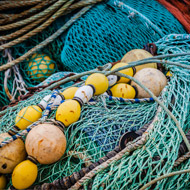Marine mammal decisions ‘should involve animal welfare’

Bycatch is one of the greatest sources of sources of marine mammal injury and death.
Management decisions involving marine mammals should consider animal welfare, according to a new study.
Writing in the journal Marine Policy, researchers argue that more focus on animal welfare would better reflect societal values and could allow for more targeted and effective conservation actions.
“In many cases, a conservation approach that includes animal welfare considerations may motivate a faster response to addressing threats than the population-based approaches that predominate today,” they write.
“Rapid action to address a threat as soon as it becomes apparent may interfere less with human activities in the long-term than more dramatic (and costly) action required once a population is in decline or there is long-term loss or abandonment of habitat.”
To illustrate their point, the team discuss two case studies: marine mammal bycatch in commercial fisheries and underwater noise from seismic exploration.
Bycatch is one of the greatest sources of sources of marine mammal injury and death. But practical measures to reduce capture of marine mammals in fishing gear have been mostly driven over population-level impacts and not animal welfare.
The researchers argue that a more ethical approach that tackles bycatch wherever it occurs, may be more effective.
An example of this is the situation with the North Atlantic right whale. Measures aimed at reducing death caused by commercial fishing operations have failed to show any reduction in mortality.
Researchers say that the time it took from the entanglement taking place, to collecting the necessary data, and then to take management action, allowed for an increasing trend in the probability of entanglement and vessel strike mortality.
“Prompt action taken on welfare grounds when the problems first became apparent in a few individuals could potentially have averted this trend,” they write. “In particular, such actions could have stopped fisheries developing in a way that poses such a high entanglement risk but is now very difficult to reverse.”
The oil and gas industries use seismic surveys to identify resources. But they are very loud, intense and can cause injury or death to individual marine mammals.
Many nations have measures in place to reduce impact to marine life, such as shutting off the sound when whales are detected within a certain zone. These measures are taken regardless of the proportion of the population likely to be affected.
As well as permanent hearing loss, seismic surveys cause stress, mask important sounds for communication and prevent animals from finding food. Researchers argue that current measures do nothing to address disturbance and may actually make it worse because the seismic survey needs to be repeated.
A different approach to managing seismic surveys that recognises a lesser impact on a larger number of animals as a problem may provide the incentives for developing quieter technologies, the team claims.
This may result in the development of more sophisticated technologies that achieve the same results, but with much lower source levels than the airguns currently in use.
“Moving forward, it seems more preferable for all concerned to work together to develop conservation policies and practice based on the best available science (and knowledge generally),” the team concludes. “Such a development would ensure that animal welfare becomes an integral part of decision-making in modern conservation practice.”
The paper, 'Why management decisions involving marine mammals should include animal welfare,’ was authored by Dr Vassili Papastavrou, University of Bristol, Dr Russell Leaper, University of Aberdeen, and Dr David Lavigne, Canada.



 The Veterinary Medicines Directorate (VMD) is inviting applications from veterinary students to attend a one-week extramural studies (EMS) placement in July 2026.
The Veterinary Medicines Directorate (VMD) is inviting applications from veterinary students to attend a one-week extramural studies (EMS) placement in July 2026.